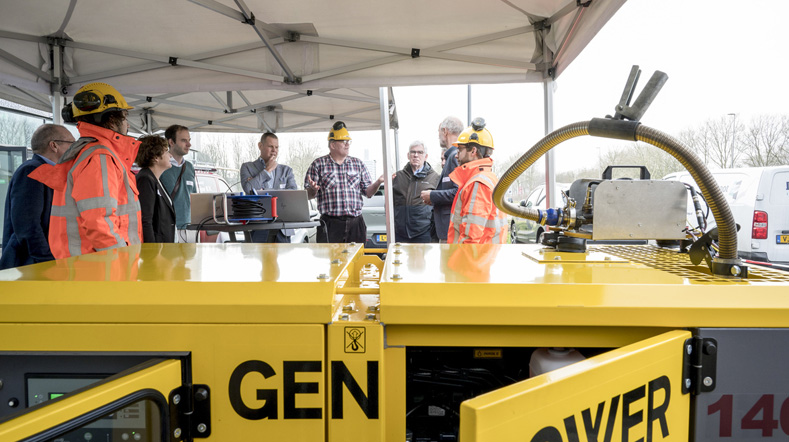
Insight into emissions and sustainability in the construction sector
In cooperation with
Various knowledge institutions, (local) government, and the business community.
TNO collaborates closely with construction companies, logistics service providers, manufacturers, and governments to create a future-oriented construction site. We achieve this by providing insights into sustainability options and by testing innovations such as circular materials, emission-free construction machines, and concepts for more efficient logistics in practice.
Major challenges for the construction sector
The Dutch construction sector is undergoing a significant transition towards sustainability, driven by the necessity to drastically reduce nitrogen, particulate matter, and CO2 emissions. In light of other major societal challenges, such as housing construction, infrastructure renovation, and the energy transition, innovation and collaboration are essential in this transition.
The construction tasks in the areas of housing, renovation, infrastructure, and energy transition must be accomplished amidst a growing scarcity of materials and personnel. At the same time, nitrogen, particulate matter, and CO2 emissions must be significantly reduced.
To help the construction sector achieve these sustainability goals, the Dutch government (Ministries of Infrastructure and Water Management, Economic Affairs and Climate Policy, and the Interior and Kingdom Relations) has developed the Clean and Emission-Free Construction programme. As part of this programme, the Clean and Emission-Free Construction roadmap has been established. This roadmap includes concrete measures that construction companies can take to reduce their emissions. Subsidies are also available for the purchase of electric construction machinery, and the programme provides a knowledge base with practical information for all players in the construction sector.
Why TNO
In recent years, TNO has extensively mapped the Dutch fleet of construction machines and measured the practical emissions of various construction machines. With this knowledge, TNO can calculate the emissions for each construction project and demonstrate how these can be reduced.
This can be achieved through electrification, the use of cleaner engines or biofuels, as well as improvements in construction logistics. By coordinating the flow of goods and personnel to the construction site more efficiently, transport movements can be reduced.
Additionally, the use of different construction methods and materials impacts the types of machines and construction vehicles needed in the building process.
This information is encapsulated in the Construction Emission Tool, which helps construction companies to visualise their emissions and choose the right sustainability options.
TNO also supports this by advising construction companies and governments on effective strategies to reduce emissions and achieve sustainability goals, focusing on the use of construction machines, the optimisation of logistical processes, and the use of circular construction materials and new construction methods.
TNO’s work does not stop at desk studies. We develop innovations in construction machinery, construction logistics, and construction methods and materials, and test these in daily practice. We do this mainly in collaboration with contractors, logistics service providers, manufacturers, and local and national governments. This way, we gain insight into what works well and where improvements are needed. Our involvement in all aspects of the construction process makes TNO a significant knowledge partner.
The construction site of the future
On the construction site of the future, circular materials are used. These reduce the burden on nature and the environment. Prefabrication means that fewer construction activities need to be carried out on-site, thus reducing disruption. In construction hubs, the flow of goods to and from the construction site is combined. This results in less transport, which is also carried out with zero-emission vehicles. Additionally, zero-emission construction machines are used on the construction site.
The construction site of the future won’t be here tomorrow. However, on the way to an emission-free and circular construction site, we are already taking steps and implementing measures to reduce the climate and environmental impact of construction. Many of our projects are examples of this.
TNO has expertise in construction logistics, construction machinery, and construction methods, and can thus play a significant role. We innovate together with leaders in the sector and enrich our work with knowledge gained from large research projects for the Dutch government or the European Commission. By sharing the lessons learned, all players in the construction world can benefit from our innovations, ensuring that the Dutch construction sector remains a global leader.
Amsterdam Vaart!
In this project, we collaborated with the Municipality of Amsterdam, Port of Amsterdam, and Waternet. The goal was to shift as much transport of construction materials as possible from road to water. To make this possible, a multimodal construction hub was often necessary.
A multimodal construction hub is a transfer point for the transshipment of construction materials from road to water and vice versa. It offers possibilities for the temporary storage of construction materials and the consolidation of construction material transport.
Between 2018 and 2023, experiences were gained with multimodal construction hubs and the transport of construction materials over water. In this project, we focused on monitoring the effect of applying and working with a multimodal construction hub.
The Municipality of Amsterdam used the experiences to develop policies on goods transport over water. The positive results have led to a continuation for several construction projects in Amsterdam. For more information on the findings, read the final report of Amsterdam Vaart (pdf).
DKTI FUNDA(CE)MENT
In this project, we collaborated with Vlot Logistics, P. van der Velden, and others to gain practical experience with zero-emission construction logistics vehicles, zero-emission machines, and charging infrastructure. This demonstrated that a well-thought-out process makes the use of zero-emission construction equipment feasible.
Zero-emission (ZE) vehicles and machines are also emerging in the construction sector. Similar to passenger cars, their range or usage is sometimes still relatively limited compared to diesel vehicles, which sometimes requires a different way of working. In this DKTI project, TNO developed a logistics concept for the use of zero-emission (ZE) machines in construction. To test the concept in practice, we monitored the use of an electric crane truck and an electric stone transporter. Through this project, we demonstrated that by designing the logistics concept of a construction project or site well in advance, ZE vehicles and machines can already be effectively used for multiple short trips/tasks per day. For more information on the findings, read the final report of Funda(ce)ment.
The Construction Emission Tool
TNO has developed a calculation tool (www.bouwemissies.nl) that provides insight into the CO2, NOx, and particulate matter emissions from road transport and construction machinery in construction projects. The tool can also show the potential effect of various emission reduction measures, such as the application of industrial construction methods for housing, logistical measures (e.g., the use of a construction hub), and the deployment of cleaner and zero-emission vehicles and construction machines.
The Construction Emission Tool, developed within the knowledge and innovation program Emission-Free Construction on behalf of the Ministry of the Interior and Kingdom Relations, provides the construction sector with a tool to make informed decisions about implementing measures to reduce emissions, for example, in the context of obtaining a nature permit. For more information, see: TNO Construction Emission Tool provides the construction sector with insight into emissions or download the report (pdf).
Advising and supporting the development of the clean and emission-free construction roadmap
TNO has supported the Ministry of Infrastructure and Water Management (IenW) in developing the long-term perspective for reducing emissions from construction equipment, such as mobile machinery, vehicles, and vessels. This is part of the Clean and Emission-Free Construction programme. The Clean and Emission-Free Construction Roadmap outlines a step-by-step plan aimed at achieving significant emission reductions by 2030.
The government has set goals for the construction sector to reduce CO2, NOx, and particulate matter emissions from construction equipment (mobile machinery, vehicles, and vessels) to minimise the negative impact on climate, nature, and health. The Clean and Emission-Free Construction Roadmap provides a step-by-step plan, proposing emission limits for construction equipment up to 2030. TNO has conducted various studies on the potential impact of the Clean and Emission-Free Construction Roadmap.
In addition to potential emission reductions, important conditions have been investigated, such as options for refueling and charging infrastructure for emission-free equipment, monitoring and enforcement of emission requirements, and financial impact. For the reports, see:
- Inventory and categorisation of current and future supply of sustainable mobile machinery, construction logistics vehicles, railway equipment, and vessels used in hydraulic engineering (opens in a new window and Dutch version).
- Transition Paths for Clean and Emission-Free Construction (SEB) (opens in a new window and Dutch version).
- Estimation of additional costs for the Clean and Emission-Free Construction programme for mobile machinery, construction transport, coastal care, and fairway maintenance until 2030 (opens in a new window and Dutch version).
- Inventory of options for supervision and enforcement (opens in a new window and Dutch version).
- Clean and Emission-Free Construction: Options for charging and refuelling infrastructure for mobile machinery, road transport, rail transport, and vessels for the construction sector (opens in a new window and Dutch version).
Get inspired
Optimal charging planning for logistics service providers considering grid congestion


Cleaner construction thanks to smart construction logistics and accurate emission measurements


